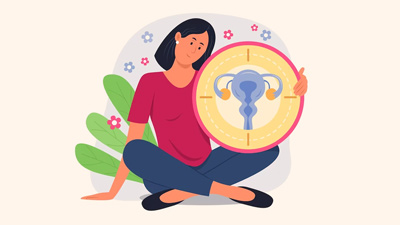Women’s reproductive health is under growing pressure in the modern world. From PCOS and endometriosis to early puberty and infertility, reproductive disorders are affecting more women today than ever before — and often at a younger age. But why is this happening? And what can we do to protect, manage, and nurture reproductive wellness?
Let’s explore this rising concern through both modern medicine and the timeless lens of Ayurveda. 🌿
🚨 Reproductive Disorders on the Rise
Here are some of the most commonly rising conditions:
1. Polycystic Ovary Syndrome (PCOS)
Affects 1 in 5 Indian women. It’s linked to insulin resistance, obesity, acne, and irregular cycles.
2. Endometriosis
Now affecting nearly 10% of reproductive-age women worldwide, often misdiagnosed and underreported.
3. Early Puberty (Precocious Puberty)
More girls are showing signs of puberty before age 8, especially in urban areas.
4. Infertility
WHO reports global infertility is rising, affecting 1 in 6 couples, with female factors accounting for about 50%.
5. Uterine Fibroids & Adenomyosis
Increasing among women in their 20s and 30s, causing heavy bleeding and pelvic pain.
6. Cervical & Ovarian Cancers
India has one of the highest burdens of cervical cancer, though largely preventable.
💢 Impact on Quality of Life
These disorders are not just medical—they affect every aspect of a woman’s life:
-
🌪️ Chronic fatigue and pelvic pain
-
💔 Anxiety, depression, and poor body image
-
💤 Poor sleep, energy crashes, and brain fog
-
🏥 Increased doctor visits, medications, and fertility treatments
-
⏳ Career, relationships, and motherhood dreams often disrupted
🧪 Modern Perspective: Why Are These Conditions Rising?
1. Hormonal Disruptors in Food & Products
-
Plastics, pesticides, preservatives (e.g., BPA, phthalates) mimic estrogen and disrupt hormones.
2. Chronic Stress
-
Overstimulation of the HPA axis impacts reproductive hormones, delaying or disrupting ovulation.
3. Processed Foods & Poor Gut Health
-
Diets high in sugar, trans fats, dairy additives, and gluten increase inflammation and insulin resistance.
4. Lack of Physical Activity
-
Sedentary lifestyles affect metabolic health and ovulation cycles.
5. Late Pregnancies & Poor Sleep
-
Women having children later and irregular sleep and shift work affect circadian hormone balance. Many important cellular compounds also diminish with age.
🌿 Ayurvedic View: What Has Gone Out of Balance?
Ayurveda recognizes reproductive health as a reflection of overall harmony in the body and mind.
🔥 Pitta-Vata Imbalance
Most reproductive disorders show dominance of Pitta (inflammation) and Vata (irregularity).
🧫 Ama (Toxic Waste) Accumulation
Poor digestion and lifestyle create Ama, which blocks the Artava Vaha Srotas (reproductive channels).
💔 Disharmony in Ritucharya & Dinacharya
Ignoring seasonal and daily rhythms affects hormonal rhythms.
🍽️ Wrong Food Combinations (Viruddha Aahar)
Combining incompatible foods leads to sluggish digestion and hormonal chaos.
🧘♀️ Emotional Trauma & Suppressed Emotions
Ayurveda links mental stress and repressed grief with yoni vyapad (gynaecological disorders).
🌟 Prevention & Lifestyle Solutions
✅ Modern Recommendations
-
Eat clean, reduce processed food & added sugars 🍽️
-
Use glass, metal, or cloth — ditch plastic where possible 🌍
-
Prioritize regular physical activity, yoga & strength training 🏋️♀️
-
Sleep before 11 PM and wake with sunlight ☀️
-
Choose paraben-free skincare and organic sanitary products 🧴
-
Get regular screenings (thyroid, vitamin D, ultrasound, pap smear) 🩺
🌿 Ayurvedic Tools for Prevention & Balance
-
Abhyanga (oil massage) with warm sesame oil to pacify Vata
-
Warm, easy-to-digest meals with digestive spices (jeera, ajwain, haldi)
-
Herbs like Shatavari, Ashoka, Lodhra, and Guduchi for hormonal support
-
Nasya therapy and Basti (enema) for detox and reproductive health
-
Rasayana foods like dates, ghee, almonds, and saffron to nourish tissues
-
Meditation, journaling, and mantra chanting for emotional release and grounding🧘♀️
🧬 What Can You Do Today?
-
Swap one processed meal with home-cooked kitchari
-
Sleep an hour earlier tonight
-
Add 1 tsp ghee to your lunch
-
Try a 10-minute walk in nature
-
Drink warm fennel-cumin water post-meal
-
Reflect on emotional blocks — talk to a friend or therapist
🩺 Final Thoughts
Women’s reproductive health isn’t just about organs — it’s about harmony. Harmony in diet, hormones, sleep, emotions, and rhythm.
As the modern world speeds up, women’s health suffers in silence. But the answer isn’t always medication — it’s awareness, prevention, and integration of modern and traditional wisdom.
🌷 Let us move toward a world where every woman is empowered with the tools to understand, honor, and nurture her body.
📚 References:
-
Nidhi R, et al. Prevalence of PCOS in Indian adolescents. J Pediatr Adolesc Gynecol. 2011.
-
Giudice LC. Endometriosis. N Engl J Med. 2010.
-
Teilmann G, et al. Prevalence of precocious puberty. Pediatrics. 2005.
-
WHO. Infertility Fact Sheet. 2023.
-
ICO/IARC. Cervical Cancer Screening in India.
-
Gore AC, et al. EDCs and reproductive health. Reproductive Toxicology. 2015.

Akanksha Sharma
Dr. Akanksha Sharma, Head Writer and creator of AtoZ of Pregnancy, is dedicated to empowering women, parents, and families through 360-degree knowledge. She and her team provide evidence-based advice to guide families through pregnancy, parenting and beyond.






